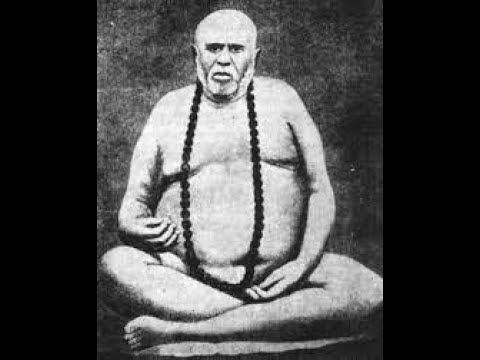Tailang Swami : Lord Shiva and Spiritual Luminary
Introduction
Renowned Hindu yogi and devotee Tailang Swami was regularly identified as a manifestation of Lord Shiva during the 17th and 18th centuries. For those on a quest of spiritual enlightenment and truth, his life offers great motivation. Celebrated yearly to honor his birth and his contributions to the spiritual and religious fabric of India, this day is Tailang Swami Jayanti Considered as the “Walking Shiva of Varanasi,” Tailang Swami personifies in his life and teachings the core of heavenly knowledge, simplicity, and devotion. The significance of Tailang Swami Jayanti, his remarkable life, and the lessons his legacy offers mankind is investigated in this essay.
Who Was Tailang Swami?
Tailang Swami was born in the small West Bengal town of Holia in 1607 with the name Shivarama. From a young age, he clearly had a natural propensity toward spirituality since he showed a great need for divine knowledge and a disengagement from worldly pleasures. His mother, Bhagavati Devi, guided him on the road of dedication and Hindu scriptures, hence fostering his spirituality.
After the death of his parents, Shivarama, then young, turned away from the world. Bhagirathananda Saraswati, his guru who started him on the austere path, roamed as a pilgrim before to meeting him. Under the direction of his teacher, Shivarama changed into Tailang Swami and committed his life to the search of emancipation, self-control, and strict meditation.
Significance of Tailang Swami Jayanti
Tailang Swami Jayanti is observed on the Purnima, or full moon, day in the Hindu month of Pausha, December–January. This day stands out for remembering the unmatched spiritual achievements, respect, and loyalty of the saint. Often engaging in rituals, petitions, and talks stressing the basic ideas of Hindu philosophy, devotees and spiritual seekers gather to honor his life and teachings.
Apart from the day of religious observance, the occasion offers a chance to restore a relationship with the spiritual values Tailang Swami supported. His life attests to the transforming power of the search of truth, tenacity, and loyalty.
Tailang Swami’s Life and Miracles
Tailang Swami is renowned not only for his profound spiritual wisdom but also for the miraculous feats attributed to him. His life is filled with stories that defy logic and natural laws, earning him the reputation of a divine being.
- Years of Tapasya (Austerities): Tailang Swami spent decades in deep meditation, often in extreme conditions. His long periods of silence and ascetic practices showcased his dedication to realizing the highest truths. He would meditate for hours or even days, submerged in water or seated on the scorching sands of the Ganges, unaffected by physical discomfort.
- Miraculous Powers: Numerous accounts of his miracles are deeply ingrained in the cultural memory of Varanasi. It is said that he could drink gallons of Ganges water without harm, walk on water, and even transform poison into nectar. One well-known tale narrates how a British magistrate, doubting his divinity, gave him a bowl of lime meant to cause harm. Tailang Swami consumed it without any ill effects, leaving the magistrate astonished.
- Unwavering Compassion: Despite his superhuman abilities, Tailang Swami remained humble and compassionate. He was known for his kind interactions with people from all walks of life. He offered spiritual guidance, solace, and blessings to anyone who approached him, regardless of caste, creed, or status.
Teachings of Tailang Swami
The essence of Tailang Swami’s teachings revolves around self-realization, devotion, and the ultimate unity of all beings. Though he was mostly silent and rarely spoke, his life itself was a profound message to the world. The following principles summarize his spiritual wisdom:
- Detachment from Worldly Desires: Tailang Swami emphasized the importance of renouncing material attachments. He taught that true happiness lies in detachment and surrender to the divine will.
- Devotion to God: He often encouraged seekers to cultivate unwavering devotion (bhakti) to God. His life demonstrated that sincere devotion can transcend the barriers of karma and ignorance.
- Unity of All Existence: Tailang Swami believed in the oneness of all creation, a central tenet of Advaita Vedanta. He saw no distinction between individuals, viewing all beings as manifestations of the same divine consciousness.
- Living in Harmony with Nature: His deep connection with the Ganges and natural elements symbolized a life lived in harmony with nature. He considered nature to be a reflection of divine power and encouraged others to treat it with reverence.
- Power of Silence: Tailang Swami’s silence was not merely an absence of speech but a profound state of being. It symbolized the inner stillness and focus required for spiritual growth.
Celebrations and Observances on Tailang Swami Jayanti
Tailang Swami Jayanti is observed with great fervor, particularly in Varanasi, where the saint spent most of his life. The following activities are commonly undertaken by devotees to honor his memory:
- Special Pujas and Rituals: Temples and ashrams dedicated to Tailang Swami host elaborate ceremonies, including abhishekam (ritual bathing of the deity), arati, and chanting of sacred mantras.
- Katha and Discourses: Spiritual discourses and storytelling sessions highlight the life and teachings of Tailang Swami. These events inspire attendees to adopt his values in their own lives.
- Meditation and Prayer: Followers engage in meditation and prayer, seeking to connect with the divine presence that Tailang Swami embodied.
- Charitable Acts: Acts of charity, such as feeding the poor and distributing essential items, are often undertaken as a tribute to Tailang Swami’s compassionate nature.
- Pilgrimage to Varanasi: Many devotees visit the places associated with Tailang Swami in Varanasi, such as his samadhi (final resting place) and the ghats of the Ganges, to pay homage.

Tailang Swami in Modern Times
Even decades after his death in 1887, Tailang Swami continues to inspire spiritual seekers. His lessons are especially pertinent to individuals seeking inner peace and wisdom in a society too often marked by materialism and distractions. Many times used as an illustration of heavenly love and committed service by spiritual leaders and groups is his life.
Current readings of Tailang Swami’s legacy usually highlight his global message. His lessons remind us as humans of the natural connectivity and connection of all life forms in a time marked by divisions.
Lessons from Tailang Swami’s Life
The life of Tailang Swami offers invaluable lessons for individuals striving for spiritual growth:
- Perseverance in Spiritual Practice: Despite the challenges of ascetic life, Tailang Swami remained steadfast in his spiritual journey, showing that perseverance is key to attaining higher consciousness.
- Humility and Compassion: His humility, even in the face of miraculous powers, serves as a reminder to remain grounded and compassionate, regardless of one’s achievements.
- Faith in the Divine: Tailang Swami’s unwavering faith in God inspires devotees to surrender their doubts and trust in the divine plan.
- Transcending Materialism: In a world driven by consumerism, Tailang Swami’s life is a testament to the fulfillment found in simplicity and spiritual pursuit.
Conclusion
Apart from honoring the birth of a saint, Tailang Swami Jayanti invites us to consider the timeless morality and principles that Tailang Swami exemplified. Many people on the road to self-realization find inspiration in his life, which was defined by great compassion, strict discipline, and extraordinary loyalty.
Let us aim to daily apply Tailang Swami Jayanti’s lessons in awareness. We can commemorate his memory and get more close to the holy truth he lived and breathed by developing unity, loyalty, and detachment. Remembering Tailang Swami reminds us that our spiritual nature should always be our first concern in life, not our means of financial achievement.
Buy Book – Click Here








